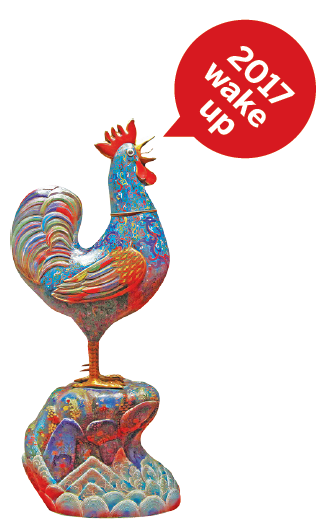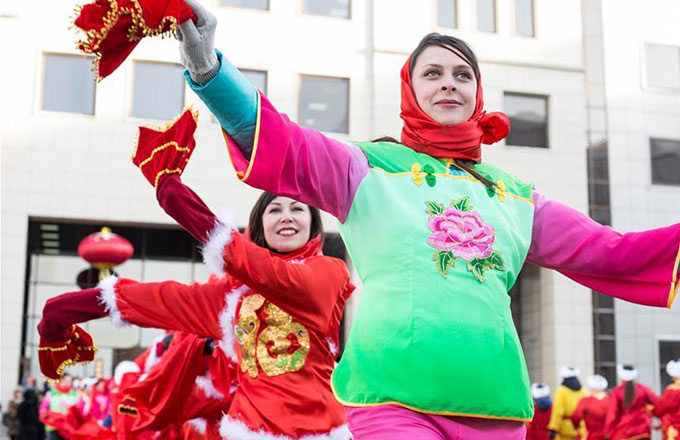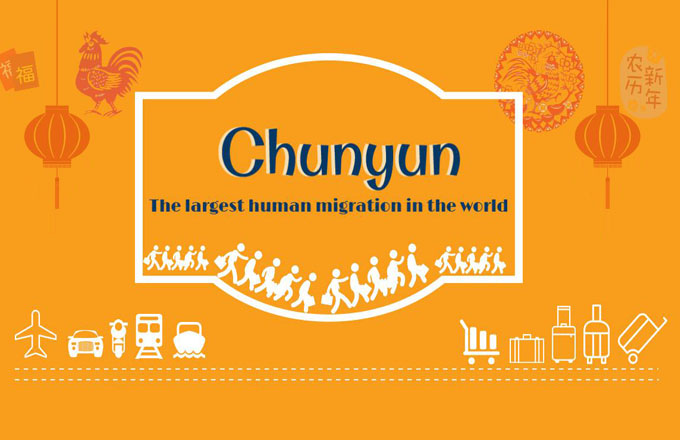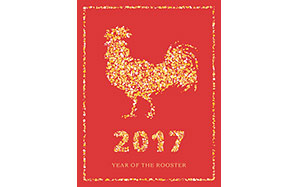Birds of a feather
 |
|
A rooster-themed exhibition at Nanjing Museum. JIAN HUA/FOR CHINA DAILY |
Related: Gee, is that what you mean by "ji"?
The first difficulty in elaborating on 2017's zodiac animal is the English translation. Rooster is the preferred choice of word, but the Chinese word "ji" is much more generic, encompassing the barnyard fowl of either sex or any age. So, you cannot say it's wrong if someone brings up "year of the hen" or "year of the chicken".
Unless one resides in North America or the United Kingdom, we Chinese tend not to make a fuss about the niceties of American or British English. In China, you'll see a mix of both, such as "People are in a long queue to get onto the elevator" or "People are in a long line to get onto the lift". If the first English book happens to be imported from Great Britain, one may well blurt out, "year of the cock" without realizing the alternative slang definition that is so widespread in America.
I did not make this up: an uptight Chinese newspaper published on its website a picture of a Scottish man "trimming his tree into a massive flashing cock". And my colleagues - those trained in the US - were convulsed in laughter at the caption.
So, I'll stick with rooster, even though the animal does carry certain sexual connotations in our cultural context. I swear no dictionary published in China lists the slang definition of "cock", which Wikipedia says is an "older" term used in the United Kingdom and Ireland. Coincidentally, the Chinese word, when doubled, happens to carry the same meaning of a phallus, but it is an endearing term that refers mostly to the underaged and does not imply anything erotic. If you hear someone pointing to a boy's "little jiji", do not assume you've discovered a pedophile.
Another sexual connotation of the fowl has only emerged in recent decades. The use of "ji" to denote a worker of the oldest profession — mind you, never "jiji" — seemed to have started in Hong Kong and spread to the rest of the country. It could be the result of a homonym, as ji shares the same sound as the first word in jinv, the most common term for prostitute. Hong Kong even produced a feature film in 2002, sarcastically titled Golden Chicken, that chronicles its history through such a woman.
To be an equal-opportunity offender, other fowls have also been recruited for the flesh-peddling career. Duck (ya) is a gigolo who serves female customers, and goose (e) for males.
The above uses are not to be confused with the English slang for chicken, an underage boy or girl prone for sexual abuse.
Is your mind like a headless chicken by now? If you are, avoid the mention of 2017's zodiac animal while in the presence of young boys or coquettish women. You'll be the target of suspicion — either as a kiddie-fiddler or a John.
Because the Chinese word ji does not specify gender, I'd sympathize with anyone translating a contemporary Chinese novel that extensively uses the euphemism for prostitutes. Would a hen be more appropriate than chicken?
Anyone standing for the rights of the hen should raise the issue with China's artists. When it comes to this domestic fowl, the female invariably gets shortchanged. A hen hatching eggs would be a beautiful sight, but in scrolls or oil paintings it's always the rooster that gets the spotlight. Fortunately, the ancient use of the rooster as a symbol of procreation is largely gone. Otherwise, a celebration of this animal would be turned into a Freudian gold mine.
- China punishes damage of cultural heritages, revolutionary site
- Latest charter flights to Sansha make trips shorter, easier for holiday makers
- China on alert against firework crime
- Snowfall disrupts Spring Festival travel in NE China
- Chinese Spring Festival celebrated around the world




















